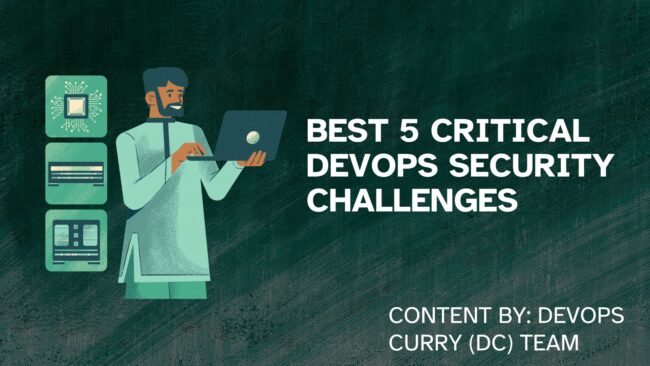DevOps Compliance Challenges
Best 5 Critical DevOps Security Challenges:-
Critical DevOps Security Challenges .When a company seeks to align with DevOps practices, it often encounters issues related to security conditions. This set of challenges is referred to as DevOps compliance challenges. DevOps supports IT infrastructure, making it more active, testable, visual, and on-demand. In the realm of digital transformation, DevOps ensures that all variations within the IT infrastructure, including the building and deployment of systems, stem from code stored in version control. This, in turn, enables traceability back to the version control.
DevOps contributes to business innovation by fostering the generation and recognition of new ideas. These ideas, although related to buzzwords and technology, encompass more than just that. In numerous organizations, altering the corporate culture proves to be a daunting task. DevOps revolutionizes the organization’s mindset, enabling the creation of products without the hindrance of committee meetings, red tape, bureaucracy, and the like.
What is DevOps Compliances?
DevOps compliance refers to the practices, policies, and processes implemented within DevOps to ensure that software development and IT operations adhere to regulatory, security, and organizational standards. It involves integrating compliance requirements into the DevOps workflow, ensuring that software systems meet legal, security, and business requirements throughout their lifecycle.
DevOps compliance consists of Implementing continuous monitoring practices to detect and address compliance issues in real-time, reducing the risk of non-compliance. It also include automated compliance check that means by utilizing automated tools to continuously monitor and verify compliance with regulatory and security standards during the development and deployment processes.
The core focus of DevOps revolves around the necessities of digital innovation. It operates to eliminate internal inefficiencies arising from both human resources and tools. While DevOps encompasses a variety of functions, organizations often encounter compliance challenges, some of which are outlined below:
- Instantaneous Changes: On many occasions, DevOps introduces immediate changes to code and deployments. The DevOps team faces challenges in ensuring compliance with testing, approval, and documentation processes. Thus, striking a balance between speed and adherence to procedures becomes an intricate task.
- Auditing & Reporting: The process of generating accurate and up-to-date audit reports within the fast-paced DevOps environment can be time-consuming and error-prone. It is essential to track compliance, manage access, and perform other related activities.
- Pipelines Visibility: Numerous organizations struggle with visibility issues when it comes to the development of CI/CD tools. Developers might lack the ability to create comprehensive automation scripts, as they may not possess a holistic vision that caters to various stakeholders’ needs.
- Continuous Security: Integrating security into CI/CD pipelines involves exposing all functions via APIs for automation. This incorporation of security tools into the development process poses challenges in achieving optimal performance within Continuous Delivery pipelines. Ensuring seamless testing, security scans, and vulnerability assessments becomes a complex endeavor.
- Training & Awareness: The product development cycle involves independent packaging, testing, and subsequent release of the product. Users and developers engage in their respective roles as they modify code. Dynamic analysis testing is employed to ascertain that changes to the software code do not lead to undesirable outcomes. Moreover, achieving compliance requires team members to have knowledge about relevant regulations and standards. The challenge lies in providing ongoing training and fostering awareness within the evolving DevOps landscape.
5 DevOps Security Challenges & Best Practices
DevOps introduces numerous security challenges due to its fast-paced and collaborative nature. Here are some common DevOps security challenges and ways to overcome them:
1. Inadequate Security Integration
Challenge: Security is often an afterthought in the DevOps pipeline, leading to vulnerabilities in the code and infrastructure.
Solution: Embed security practices into every stage of the DevOps process. This approach, known as DevSecOps, involves automating security checks and incorporating security tools from the beginning of the development lifecycle.
2. Lack of Visibility and Control
Challenge: The dynamic and continuous nature of DevOps can make it difficult to maintain visibility and control over the entire pipeline, increasing the risk of security breaches.
Solution: Implement centralized monitoring and logging systems to gain visibility into all activities. Tools like SIEM (Security Information and Event Management) can help monitor, analyze, and respond to security threats in real-time.
3. Configuration Management Issues
Challenge: Misconfigurations in infrastructure as code (IaC) can lead to security vulnerabilities.
Solution: Use automated configuration management tools like Ansible, Puppet, or Chef to ensure consistent and secure configurations across environments. Regularly audit and review configurations to identify and fix potential issues.
4. Third-Party Dependencies
Challenge: Relying on third-party libraries and tools can introduce vulnerabilities if they are not properly managed.
Solution: Regularly scan and update third-party dependencies using tools like Dependabot or Snyk. Establish policies for approving and monitoring third-party components to ensure they meet security standards.
5. Insufficient Access Controls
Challenge: Poorly managed access controls can lead to unauthorized access to sensitive systems and data.
Solution: Implement the principle of least privilege, ensuring that users and systems have only the permissions they need to perform their tasks. Use tools like Role-Based Access Control (RBAC) and multi-factor authentication (MFA) to enhance security.

